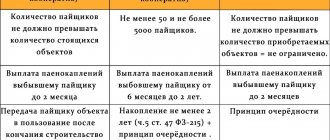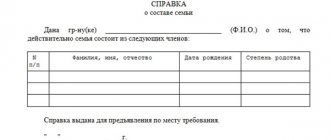Concept
The precise definition of this term is important for resolving various disputes. To determine which family members can be included in the named unit of society, it is necessary to familiarize yourself with the legislative norms. Housing and marriage and family law will help with this.
Typically, the concept of family members is used when applying for subsidies for utility bills, as well as for providing documentation to the administration for improving housing conditions.
The family is under state protection. This is enshrined in Article 1 of the RF IC. It also says that marriage is registered with the civil registry office. In the family, all members manage the household and raise children. They have rights and responsibilities.
Definition of close relationship
But the opposite picture also occurs, when a close person is essentially a relative, but there is no documentary evidence of the degree of kinship in the family according to the law in this regard, and a certain dilemma arises. New innovative methods will allow us to solve it today. True, you will still have to run around and collect a lot of information.
First of all, you will need to find at least some documents confirming the degree of relationship. It is best to contact the registry office.
It may be located in another region or country, but the answer, as a rule, always comes along with copies of documents available there. There is still an opportunity to go to court at your place of residence and try to draw up a competent statement of claim that will help convince the judge.
Only here you can’t do without some supporting documents.
True, now there is an opportunity to do a DNA examination. With its help, it is not difficult to prove your relationship, even if it is not only brothers and sisters, grandparents, but also other first and second cousins.
Summing up some results, I would like to say that there are still a lot of shortcomings in this issue. Many people become close relatives, but are not considered such by law.
Vague formulations such as “family members” are not always satisfactory and often go against the realities of life.
To date, there is no clear definition of close relatives, despite the fact that some amendments have been made to certain articles of various codes regarding this issue. There is hope that we will still be able to resolve it and draw up a clear list so that so many controversial issues do not arise.
Who belongs to relatives according to the law, see in the video:
Summary
Such a concept in legislation as close relatives is used to regulate certain social relations. These persons usually include citizens related by blood to each other.
The list of citizens who are close relatives may vary depending on the area of application of the law, so it is possible to determine who exactly belongs to them from various legal norms. To identify kinship, legislation is mainly guided by the general principles of the family code .
It is generally accepted that spouses are not close relatives, but family members. Therefore, legal norms indicate separately the husband and wife along with other relatives. In another case, the law classifies not only spouses, but also other close relatives as family members.
The degree of kinship plays a big role in the distribution of inheritance in the absence of a will. The legislation establishes a special order of inheritance , depending on which family members or close relatives have the right to claim the property of the deceased.
Also, the degree of relationship is important when receiving an inheritance for citizens who, by law, are entitled a mandatory share in the inheritance or who have the right to count on certain benefits when paying state fees when registering the right to inheritance.
Who are the family members?
According to the Criminal Procedure Code (clause 4, article 5), family members:
- spouse;
- parents;
- children;
- adoptive parents and adopted children.
These also include:
- siblings;
- grandparents;
- grandchildren.
Moreover, no other family members can be included in this social group. It should be noted that the relatives that make up it may or may not be blood relatives. But they must have a common household. They also financially support each other.
In housing legislation, the definition of family composition may vary depending on whether the family lives in an apartment that is owned or rented under a contract. Documents confirm cohabitation, for example, a birth certificate or housing papers. This is required in resolving various disputes.
Who are legally considered close relatives?
Various regulations establish the concept of close relatives for a certain branch of law. Therefore, the composition of close relatives directly depends on the law enforcement situation.
Legal acts:
- Civil Code of the Russian Federation. If we consider the issue in the context of inheritance law, then the issue of kinship is relevant in inheritance by law. Depending on the degree of relationship, relatives are divided into queues. 1st line heirs – parents/children of the testator and second spouse.
- Code of Administrative Offences. Administrative legislation includes the list of close parents/adoptive parents, natural/adopted children, brothers/sisters. As well as grandparents and grandchildren (Article 25.6 of the Code of Administrative Offenses of the Russian Federation).
- RF IC. Family law includes grandparents, parents/children, brothers/sisters with common parents (Article 14 of the RF IC). Here, as in the Administrative Code, different hereditary lines are indicated.
- Tax Code of the Russian Federation. The amount of the state duty when registering an inheritance is established according to the degree of relationship (Article 333.24 of the Tax Code of the Russian Federation). Heirs of the 1st and 2nd line pay 0.3% of the inheritance price. While other heirs must pay tax at a rate of 0.6%. As you can see, parents/children, spouse, brothers/sisters have a material advantage.
- Code of Criminal Procedure of the Russian Federation. The interpretation of the Criminal Procedure Law is identical to that prescribed in the Code of Administrative Offences.
Who can be a family member?
Citizens who are not considered relatives of the owner of the premises can also be defined as family members. This is observed when they live in one place and are settled there by the owner of the property. It is also important that a person not only lives in the premises, but also has some relationship with the owner and other people living with him in the same living space.
Family members have relationships with each other based on mutual respect, mutual care, non-property and property rights. Their economy, as already mentioned, should be common. Rarely are family members people who are not officially considered relatives.
How are immediate family members different from other family members?
It is possible to determine the differences between family members and close relatives only when certain legal relations arise, since some provisions of the law may indicate different citizens as family members .
Thus, based on the norms of family law, when alimony obligations arise, it becomes obvious that spouses and close relatives are generalized and indicated as family members . In another case, according to the norms of housing legislation, family members include only spouses , parents and children (Art.
31 Housing Code of the Russian Federation). However, this article indicates the possibility of recognizing third parties as in court.
Based on the norms of civil law , we can conclude that not all family members are considered close relatives, since there is no indication of spouses . However, in another case, some relatives may be part of the family.
Article 14 of the RF IC
Article 14 of the RF IC is of particular importance in this issue. It contains conditions for the impossibility of marriage. According to this article, they are as follows:
- the presence of an undissolved marriage;
- close relationship;
- marriage between adoptive parents and adopted children;
- if at least one person is incapacitated.
These conditions will not allow you to start a family, but in other cases there are no obstacles to marriage.
The property and non-property rights of married people are outlined in Articles 31 and 32 of the RF IC. By law, they have the right to protect their interests if they have been infringed.
Don't have time to read the article?
Article 14 of the RF IC states that close relatives are blood relatives in one generation, across a generation and in neighboring generations. In simple terms, in family law, close relatives are parents, children, grandparents, grandchildren, brothers and sisters (full and half-blood).
It is noteworthy that according to the Family Code, a husband and wife are not close relatives , since they are not related by blood. Spouses are recognized as family members in accordance with Article 2 of the same Family Code.
Expert opinion
Makarov Stanislav Tarasovich
Legal consultant with 8 years of experience. Specialization: criminal law. Extensive experience in document examination.
However, an officially registered marriage, by law, is considered a special type of relationship. Therefore, despite the lack of family ties, husband and wife have some privileges.
For example, if one of the spouses died without leaving a will, then the second is the heir of the first priority, like close relatives.
Marriage and family legislation
According to the law, the family begins with the official registration of the marriage of the spouses. If everything is documented, the parties acquire official rights and obligations.
The Family Code includes rules for marriage. This is stated in Article 10 of the RF IC, which defines the rights and obligations of spouses. Divorce is also regulated by the RF IC - Article 16.
After a divorce, the rights of children should not be infringed. The responsibility for their maintenance falls on the parents (Article 80 of the RF IC).
According to marriage and family law, adopted children are considered family members. After completing the relevant documents, such parents and children also have rights and responsibilities towards each other. And although in this case there cannot be common ancestors, it is still a family. This is confirmed by an adoption or guardianship document.
Which relatives are considered close
Expert opinion
Stanislav Evseev
Lawyer. Experience 12 years. Specialization: civil, family, inheritance law.
Close relatives are ancestors and descendants along a vertical/horizontal line. Ancestors are considered to be people who precede by blood relationship, that is, parents in relation to their children. Children of blood parents are recognized as descendants.
However, there are exceptions in the law. The lack of blood relationship between the adoptive parents still makes them relatives. This also applies to legal spouses. They are recognized as such after marriage registration. Whereas there is no blood relationship between these persons.
If a man and woman live in a civil marriage, then they are not recognized as relatives. Such persons do not have the right to inherit. An exception may be the presence of a will. The testator has the right to dispose of personal property at his own discretion.
Cousins
Cousins are not close relatives. But that’s how their parents will be to each other.
They are vested with the right of inheritance by right of representation in the event of the death of the uncle or aunt of the deceased before the death of the owner or together with him.
The Civil Code classifies cousins as third-order heirs by right of representation. Therefore, they pay a state duty upon entering into an inheritance in the amount of 0.6% of the value of the property received.
Husband and wife, spouses
Husband and wife cannot be relatives. Moreover, the law prohibits marriage for persons who are close relatives (Article 14 of the RF IC).
As a result of registering the relationship between them, another connection arises - a marriage union. However, the connection is valid only during the marriage. After the dissolution of the relationship, the mutual rights and obligations of the spouses cease.
The husband/wife inherits property after each other as 1st line heirs. However, the right does not apply to former and common-law spouses.
Grandmother
Grandmother is a close relative of:
- your daughter/son;
- granddaughter/grandson.
The grandmother of the legal spouse is not related to his wife. From the perspective of the Civil Code, grandmothers are heirs of the 2nd line.
Native sister
The Investigative Committee of the Russian Federation and the Code of Administrative Offenses of the Russian Federation classify sisters as relatives. At the same time, such persons inherit the property of the deceased person as heirs of the 2nd line.
The law applies to sisters:
- full sisters (the same mother and father as the testator);
- not full sisters (half-blooded or half-sisters);
- girls adopted by the blood parents of the testator (if the adoption was not canceled before the citizens reached adulthood;
- girls adopted by the adoptive parents of the testator (if the adoption of one of the children was not canceled before the citizens reached 18 years of age).
Does not apply to sisters:
- girls taken into custody or into a foster family by the parents or adoptive parents of the testator;
- stepdaughters of the blood parents/adoptive parents of the testator.
Mother in law
Any citizen can be a relative of one spouse and a stranger to the second. For example, mother and son are related. They inherit property after each other.
If the son gets married, then his mother becomes the mother-in-law in relation to the legal spouse. Mother-in-law and daughter-in-law are not related to each other. They also do not have the right of inheritance.
Uncle
The brothers are close relatives. Although they inherit property one after another as heirs of the 2nd stage. Their children are first cousins.
Uncles are no longer close relatives in relation to nephews. They are classified as successors of the 3rd stage and pay a duty in the amount of 0.6% of the value of the property received.
Brother
A sibling is a close relative according to the RF IC. By sibling is meant a half-brother or half-brother.
The right of inheritance for such persons arises as for heirs of the 2nd stage. Priority is given to the natural children, parents, and spouse of the deceased person.
To obtain inheritance rights, blood ties are not enough. It is necessary that parents officially recognize each of the children.
If a sibling is adopted as a minor, he loses the right of inheritance in relation to all members of the blood family, including brothers.
Cousins
Cousins are not close relatives. Their parents have this status.
Cousins inherit by right of representation in the event of the death of their parents before death or at the same time as the testator. They are not singled out as independent heirs.
Grandchildren
The Code of Administrative Offenses and the Code of Criminal Procedure of the Russian Federation classify grandchildren as close relatives. If we look from the position of the Civil Code of the Russian Federation, then such persons do not have an independent right of inheritance in relation to the testator.
But, if the direct heir dies before the testator, then the grandchildren inherit his share of the property by right of representation.
Example. Citizen R. died at the age of 87. 3 weeks earlier, his eldest son died. The estate included a 2-room apartment. The deceased's youngest son and granddaughter (daughter of the eldest son) entered into the inheritance. Each heir receives ½ share of the property.
Cousin
Cousins are not close relatives. Only their parents have this status.
Cousins do not inherit property after each other as independent legal heirs. They are the legal successors by right of representation in the event of the death of the deceased's aunt or uncle.
Father-in-law
Father and daughter are close relatives. They inherit property after each other. If the daughter marries, then her father becomes the father-in-law in relation to the legal spouse.
The father-in-law and the daughter's husband are not related to each other. They also do not have the right of inheritance.
Housing legislation
Each family member has the right to living space. This is confirmed by Article 40 of the Constitution of the Russian Federation. But usually with a divorce there is a need to divide the premises, because no one’s rights should be infringed. The norms for this procedure are established by Article 38 of the RF IC. Most housing issues are resolved through the court, which makes it possible to divide the living space.
Family members of a child are parents, brothers, sisters. The owner of the home has the right to move in relatives who are dependent on him, as well as disabled citizens and other persons who are not relatives.
Please note that the concept of “family member” is defined differently in marriage and family and housing legislation. In the first case, this is a person who is related and also has the same ancestors. Accommodation may also be separate. And according to housing legislation, a family member must live with the main tenant and have a residence permit.
Peculiarities of defining family members in labor relations
Within the framework of labor relations, understanding who, from the point of view of the law, refers to members of a person’s family, is important both for ordinary employees and, not least for managers, personnel and accounting department workers. Thus, within the framework of labor laws and tax regulations, family members may have a certain influence on the work process of individual workers. First of all, this concerns the situation of providing an employee with unpaid leave for family reasons. It is provided for a duration of five calendar days in the event of the death of a family member, wedding or birth of a child.
Have you ever experienced delays in child support payments?
Not really
Another important aspect of the labor relationship where a clear definition of who is considered a family member and who is not may be necessary is when an employer pays financial assistance, for example, in connection with the death or illness of a relative. Why is this so important to an employer? This is due to the fact that financial assistance in some cases is not subject to either personal income tax or any insurance fees.
Family members are also important in the context of receiving child care benefits. After all, any family member can actually go on maternity leave and receive maternity benefits. This can be used to provide the largest amount of care allowance, or, on the contrary, to provide child care without the actual separation of both parents or one of the parents from work.











